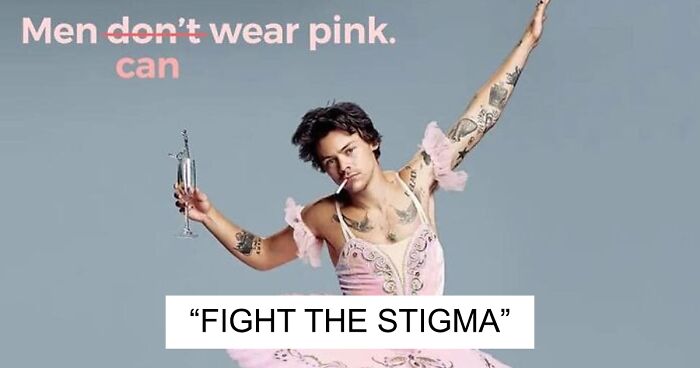
Social Media Campaign Highlights Everyday Toxic Masculinity And How Dangerous It Is
The Renaissance Youth Leaders Forum (RYLF) is a socio-civic organization from Silliman University in the Philippines, dedicated to bridging social, cultural, economic, and political divides, and creating a positive change in the community. On November 21st, the organization released a social media campaign against toxic masculinity under the hashtags #FightTheStigma and #UNMUTE.
“Both men and women suffer from toxic masculinity,” the message of the campaign says. “It happens every day both online and offline.”
To illustrate its point, RYLF shared a series of posters. From wearing pink to crying, the organization addressed the ways it thinks society pressures men, distorting their relationship with themselves and the world around them.
Image credits: Renaissance Youth Leaders Forum
Image credits: Renaissance Youth Leaders Forum
To put it simply, toxic masculinity is suppressing emotions or masking distress. It’s maintaining an appearance of hardness and perceiving violence as an indicator of power. It’s the result of teaching boys that they can’t express emotion openly, that they have to be “tough” all the time, and that anything other than that makes them “feminine”—weak.
According to the American Psychological Association (APA), these cultural lessons have been linked to “aggression and violence,” leaving boys and men at “disproportionate risk for school discipline, academic challenges and health disparities,” including cardiovascular problems and substance abuse.
“Men are overrepresented in prisons, are more likely than women to commit violent crimes and are at greatest risk of being a victim of violent crime,” the American Psychological Association (APA) wrote.
Image credits: Maud Fernhout (the social media campaign did not have permission to use this photo)
Image credits: Renaissance Youth Leaders Forum
“[This digital campaign against toxic masculinity] is the third iteration in the UNMUTE series,” a RYLF spokesperson told Bored Panda. “The objective of UNMUTE is to shed light on issues that are prevalent/relevant but rarely discussed and to ‘unmute’ the silence [they create]. We wanted to get people to converse, to start talking about these things, and at the same time to produce facts, especially to those who are not properly informed or who don’t have easy access to such information. A lot of us here in RYLF have experienced the stigma first hand, and we felt that we needed to do something about it because we believe acknowledging the problem is the first step in solving it.”
Image credits: Renaissance Youth Leaders Forum
The spokesperson said the campaign has been receiving mixed responses. “We have received a large number of both positive and negative feedback on the campaign. And it’s par for the course. The purpose was to raise awareness and get people talking about this issue, and we can say that we have done precisely that. To inform, to educate, and to encourage people to talk about it. To Unmute the Silence.”
Image credits: Renaissance Youth Leaders Forum
Image credits: Renaissance Youth Leaders Forum
Image credits: Renaissance Youth Leaders Forum
Societal pressures, expectations from family, friends, and partners, and even expectations of religious identities can be burdensome to a man seeking out his masculine identity.
While some social, political, or religious groups may provide a set of guidelines for a healthy form of masculinity, experts say it is better for an individual to stick to their own definition, so long as it does not harm themselves or others.
A new definition of what it means to be male might includes overall human experiences, such as: openly experiencing a wide range of emotions, interdependence, vulnerability, cooperation, kindness, softness. This does not mean abandoning all traditionally masculine traits. Including some traditionally masculine characteristics, such as strength and adventure, may help some people define their own masculinity. Again, this does not mean that abandoning all traditionally masculine traits is the answer. People should define masculinity on their own terms, and including some traditionally masculine characteristics, such as strength and adventure, may help to do that.
Here’s what people said about toxic masculinity
Image credits: www.facebook.com
Image credits: www.facebook.com
Image credits: www.facebook.com
Image credits: www.facebook.com
Image credits: www.facebook.com
Image credits: www.facebook.com
Image credits: www.facebook.com
65Kviews
Share on FacebookThe term “Toxic Masculinity” is not a slight against men at all. It is a term to describe the lunacy of what society expects of a man. Such as “men don’t cry”, “real men don’t seek help they just man up”, and the classic “boys will be boys” which is a lame blanket excuse to forgive boys and men for making stupid and sometimes harmful choices. My youngest son got a My Little Pony from a friend, he loved it and carried it everywhere. I didn’t freak out or take it away because he was having fun, but other fathers might have “been worried” that their son might not grow up manly and that is BS.
Thank you!! Seriously, the strongest people don’t feel the need to walk over others to get there. We need people to speak up about toxic masculinity and their experiences with it so we can realize what we did wrong.
Load More Replies...When you're a man and you're starting to open up and expose your vulnerabilities to other people and they try to shame you and belittle you for them, remember: It's their problem. They are wrong for demanding you squeeze yourself into a tiny corset. If they don't respect you just the way you are, you may be in need of better friends...
Thank you for giving us these words. It’s very important that people realize this and don’t shut down. Call them out and/or look for others who understand the value of someone opening up about their vulnerabilities.
Load More Replies...It seems from the comments a lot of people still don't understand the term. It does not imply that being a man is toxic. "Toxic masculinity" implies three key things; that all men must act 'tough' to be considered manly, that all men must reject anything considered feminine like emotional behavior, and that all men must strive to have power over others, especially women. When all three traits are seen in someone that persons energy and what they project is toxic.
oh my gosh...dude thanks for being a quality human being and standing up for the movement. we need more people like you :)
Load More Replies...And it's a pretty darn awesome color, too!! I LOVE IT
Load More Replies...To all those idiots denying toxic masculinity: you are part of the problem. Men CAN wear pink, CAN cry, CAN be scared, CAN be feminists. Wanna wear pink? Go for it, I'll punch anyone who tries to stop you (that's not good at all. Don't punch people). Heck, wear glitter! And it's okay to cry, it's a good way to let all your emotions out. It's okay to be scared. Everyone gets scared sometimes. I find that saying "I'm scared" actually makes me feel less scared. And like the poster above said, "Men of quality are not afraid of equality." Feminist AF! So to you idiots denying toxic masculinity or even encouraging it: you can go f*ck yourselves. We're not taking your bullsh*t anymore.
I don't understand this, because I was lucky enough to have a really great father who wasn't afraid to show his emotions, and was a feminist before his time. My father was born in 1929, had 5 kids, 3 of them daughters. I was born in 1960. My father was proud of the fact that "he didn't have a princess in the bunch". He taught us to take care of ourselves. Because he did understand how men could be. He taught us some basic self-defense. But also, how to change a tire, how to change the oil on our car, how to figure out some basic things if the car broke down. He never wanted us to be reliant on someone else for our well being. He did stick to some of the old ways, in that he would stand if a woman walked in a room, he'd hold doors (although frankly, he was the kind of guy that held doors for everyone), he'd always way over tip when he went out to eat, because he thought wait staff had it harder, and they were generally women. He taught us to respect men by being a good man.
The same with my father. He has two girls and has taught us how to take care of ourselves. He has protected us from some scummy dudes, but I think any good man would do that.
Load More Replies...Loved the last one of the man with the sign. CHANT IT WITH ME FOLKS! MEN OF QUALITY ARE NOT SCARED OF EQUALITY!MEN OF QUALITY ARE NOT SCARED OF EQUALITY!MEN OF QUALITY ARE NOT SCARED OF EQUALITY! WOOHOO
It's sad that people need a social media campaign to find the courage to be who and what they want to be. It's also sad that a lot of male and female trolls will be ridiculing this campaign, because it's turning men into "weak and oversensitive crybabies." Let's hope that this madness of toxic masculinity and femininity soon will be over and gone. There are far more important issues to address if we want to leave a healthy and peaceful world to the next generations.
Hi! The photo of the crying guy is mine and was used without permission. Could you please change the image credits to me (Maud Fernhout, www.maudfernhout.com) or remove the photo? Thank you.
oh I didn't know BP used photos without permission! Isn't that illegal?!
Load More Replies...We should add it's ok for men to like fruity drinks. I'm not that big into alcohol, but daiquiris are awesome.
Some people really have a problem understanding that "masculine" doesn't mean "men". It means behavior that society expects from men. Take a look at a "tom boy". That's a girl that is behaving in a masculine manner, and she could easily express behavior that would qualify as "toxic masculinity". Boy that act in a feminine manner are not tolerated as much by society, and are called names, but they exist // masculinity and femininity are behaviors which are not directly tied to men and women, so don't conflate the two. Toxic masculinity is when ANY person takes masculine behavior to an unhealthy extreme. And as such toxic femininity would be taking feminine behavior to an unhealthy extreme. A man, woman or other gendered person could easily fit into either situation. The problem is that social norms PUSH men into the masculine role, and shame men if they move into a feminine role.
Such things make me wonder as to when human sanity went down the drain and why have we stereotyped ourselves solely on the basis of hormones and the one extra chromosome (Y or X). Why haven't we accepted ourselves as simply humans made out of the same bloody stock with the same frickin emotions and feelings ? Also... there are so many people who have commented on this post with BS...... read @MikeCrow's answer.
Sometimes my sanity goes down the drain when I see fools denying toxic masculinity. Honestly, it makes my brain hurt.
Load More Replies...Please make sure to reference the rightful artist of the first photo (the crying boy) made by Maud Fernhout in 2015 for his powerful project what real men cry like
Hi! The photo of the crying guy is mine and was used without permission. Could you please credit me (Maud Fernhout, www.maudfernhout.com) instead of the organization or remove the photo? Thanks
I’ve only heard “Boys will be Boys” in terms to when they are kids, like toddler and kindergarten. And I believe it is valid cause boys naturally have more whatever it is that makes them play rougher than girls in most cases. I don’t see anything wrong with the rest of this post,
Being boys is not an excuse for not learning the same self-control behaviors we expect of girls. Those are the self-control behaviors they will carry as their internal compass into adult-hood.
Load More Replies...It is toxic masculinity because the expectations of being a man hurt us all. Don’t tell little boys to play ‘soldier’ and throw out their dolls or stuffed animals. Let them be able to do both. Don’t turn them away or dismiss their tears and tell them to man up, that’s heart breaking. I am a female, and I wish to have equal opportunities to success, self growth, access to knowledge, and development of strengths and skills based on my intelligence and capabilities. Why? I want to be fulfilled. I want to stand next to the people I care about and understand them, ease their burdens, pull my weight in the relationship. If you want to cry and talk about your feelings, please do because I’m not a wizard. It takes a lot of strength to be vulnerable. It takes a lot of guts to be who you wish to be. It takes a lot of manly tears and sweat to pave the way towards a progressive and equal society. Give us the tools to join so we can get there faster. You’re our family, friends, lovers, and partners
We want to know the real you. We want to know how to help you. We want to do our part and “hold up half the sky” with you.
Load More Replies...I don't mind if someone has a sexual preference for a certain type of man. I do object to someone attributing the end of the world to a variety of gender expressions.
Load More Replies...I feel that we lost the balance somewhere along the way. Men are afraid to show emotions so as not to be deemed as weak and women are overly aggressive out of the same fear. We are all human beings and the soul has no gender and it can easily be as scarred. Love and compassion are the healer and the nourishment.
Love is the strongest force in the universe - but it has a nasty antagonist, fear.
Load More Replies...fun fact pastel pink was originally a "boy's colour" I feel like colours should not be thrust on genders, I personally liked the other gender's presents/notebooks/ect in school
All men should be able to anything they want. They should be able to cry to feel scared to feel vulnerable and react to loss and sadness. They have a heart, a soul and the same emotions as women do. They feel loss as much as women do and should be able to show it as women do. It doesn't make them weak, it makes them human. And there is NOTHING wrong with that. And yes, I am a woman. 🙂
One of the things that I like most from my husband is that he always cry like a baby with movies, or talk about how handsome is that or that other actor. Oh, and he also have several pink shirts and t-shirts that suits him great. All those things make him sexy AF and manly as a man can be
I ain't a man, but society frustrates me. Men and boys shouldn't have to deal with this stuff, no more than women should have to deal with people pressing expectations on them! Still, I'm glad there are so many supporting people in the comments. Goes to show that there are those who will accept you for who you are. :)
Toxic Masculinity = Most jobs that deal directly with vulnerable people are considered women's work, 1. Daycare employees 2. Elementary School Teachers 3. Home health aids 4, Nurses in general (still female-dominated) 5. Working with the physically or mentally challenged 6. Nursing home employess. As a Christian, I believe that whatever we do to the least of his brothers and sisters we do unto the Lord.
Real quick: If you are an antagonistic, violent female that physically assault (or mentally abused) another person, male or female, don’t expect any sympathy. Don't think you can drive them into a corner and bully them, but act like the victim if they snap. Don’t spout the nonsense, “be a man.” Expect to be charged for battery and assault.
Thank you for this comment. This is very true. Some women feel like they can get away with a crime simply because they are a woman. If someone committed a crime, man or woman, they are guilty.
Load More Replies...I have accepted that I won't be able to "undo" all the toxicity that was figuratively and literally beaten into me as a person with XY chromosomes. However, I can continue to make progress, and I certainly can encourage others to be their true selves. I'm glad to see this issue being discussed in public forums.
Toxic masculinity has existed for far too long and it is time for society to let it go. I have been able to witness a good example of what a real man is. My father worked for the highway department for my over twenty years and that is certainly a manly job. But he also cooked a lot of our meals, prepared school lunches for me and my sister, he watches soap operas. The thing that I admire about him the most is that he shows his emotions. When his oldest sister passed away in 2019, he cried a lot at her funeral and I wasn't shocked or upset about this because I knew that they were very close.
Sorry I'm late to the party but there is a song bout toxic masculinity by a guy called will jay https://youtu.be/cmLsiFNgN20
It breaks my heart that a man can be considered "less than" because he chooses to stay home with his children, or he cries at times. I was the only person to applaud when I went to see a stand-up comic whose day job was to stay home and raise his children. So clapped even louder. I am female and know I do not have much maternal instinct (which is why I did not have children) and I admire anyone who can do this well, male or female. This man is, and should be proud of the contribution he makes to his family, and it was so sad to see others belittle his fatherhood.
My dad showed me what toxic masculinity is when I was quite young. A guy had pulled up in his car right outside our house - close enough that we could see him inside, screaming and shouting at his sobbing girlfriend. He broke the car window in a fit of rage and then started yelling "LOOK WHAT YOU MADE ME DO!" As they drove off Dad had a disgusted look on his face, and he said "That's not a real man." It was an important lesson for my sister and I. I still think about that poor girl and hope she got away from that piece of garbage.
I was raised in a conservative and very religious home, and never once did any of these come up. It has nothing to do with political and religious beliefs. It has everything to do with being comfortable with who you are, and trying to raise a well adjusted human. I feel bad for anyone who actually believes that men should wear certain colors, and should never be caught crying.
My father was brought up with much of "toxic masculinity". I say 'much' because he was never EVER a violent man. But he had issues in displaying emotions. They were there, but it took conscious effort on his part to actually display them. We knew he loved us, but he could only rarely actually say it. Knowing that, I made sure to say it to him when I knew he would want to say it. It helped. And after he passed, I kept the habit. I make sure to tell my son I love him every time we part company, usually when I go to work or to bed. I want him to know it every day, and should the worst befall me, he can well and truly think back and remember the last thing I said to him was "I Love You." I'm 64, my son is 32. I think he's got the gist of it by now.
An example on toxic masculinity is the comment section on that Gillette commercial on Youtube: "We believe, the best men can be". Check that out, it's really awful. Initially I thought it was a joke somewhere that I missed or something, but the toxic comments just keeps going.
This is causing a lot of trouble, lets just kill all the gender problem birds with one stone and get rid of gender. Just put it next to the bins on Thursday and ask the garbagemen to take it with them.
to 'tough it out ' was not gender specific when I was growing up. The world wasn't mollycoddling anybody back then that I know of, -well, except maybe Aunt Marion.
You can still get the job done, while crying or showing emotion. It isn't mollycoddling anyone to allow for them to have feelings.
Load More Replies...yes, this is what I've been dying to hear for so long! Thank you whoever brought this campaign up! I'm a girl, and I've felt that men can do everything as mentioned above for as long as I can remember. And it enraged me to the max when people were like "men don't cry blah blah blah" from the start! I'm so thankful someone decided to finally speak up about this... Much love. xx
Someone asked for toxic femininity: female genital mutilation that affects pleasure, the expectation to be a superstar at home and at work, self-victimizing, more likely to be held back by doubt and familial obligations, much more likely to be sexualized and objectified, and etc... (will get back to you, but this post is about men so maybe not)
The question about "toxic femininity" is interesting because the people asking it are still confused. They still think "toxic masculinity" is about men, so "toxic femininity" should be about problem women... but it isn't about men and women, it is about masculine and feminine behavior. For example, it is considered "masculine" to be aggressive. Therefore "toxic masculinity" is when someone is too aggressive. On the other hand it is considered "feminine" to be passive. Therefore "toxic femininity" is being too passive. Other feminine stereotypes include "emotional", "supportive", "caring", "tolerant", "submissive", "gossipy".... it is when those things get out of control that we have "toxic femininity". And it can happen, but you might notice that at least half of them will result in making the woman herself suffer, not others.
Load More Replies...This is just another made-up term based on some unscientific idea, and widely adopted as fact within a social media-generated society. It's also a poorly worded and deeply offensive term, that gives no indication whatsoever of its meaning - a meaning that changes depending on the person you're talking to. This concept of encouraging men to show emotion and not be afraid of typically feminine attributes and preferences is nothing new. Men have been evolving out of it for generations. It's not some startling brilliant revelation, as the woke generation or whatever they call themselves are trying to sell it. But this is not even what the term implies. If you take the definition portrayed in tv commercials, it's guys grilling, and boys wrestling on the lawn. If you hear a feminist define it, it's basically any male characteristic they find themselves uncomfortable with.
Harry Styles wears what he wants to wear when he wants to wear it. Nobody *forced* him to wear anything.
Load More Replies...I understand where you're coming from, but which gender expectations should we keep? Men are responsible for killing spiders for women? Women are responsible for cake decorating? Men hunt, women gather? It would be easier to dispense with 'expectations' and just treat each other as equally capable people, with equally valid feelings.
Load More Replies...You have an absolute right to act as you like, what we are fighting for is your right to act differently if you want to, and that nobody is forcing you to behave like that.
Load More Replies...Toxic Masculinity is a term to describe things that men do that are harmful to themselves and other men. Such as not seeking help because it is not a manly thing to do. Or bullying a man who loves to wear pink and watch cartoons. There is no need for it.
Load More Replies...The term “Toxic Masculinity” is not a slight against men at all. It is a term to describe the lunacy of what society expects of a man. Such as “men don’t cry”, “real men don’t seek help they just man up”, and the classic “boys will be boys” which is a lame blanket excuse to forgive boys and men for making stupid and sometimes harmful choices. My youngest son got a My Little Pony from a friend, he loved it and carried it everywhere. I didn’t freak out or take it away because he was having fun, but other fathers might have “been worried” that their son might not grow up manly and that is BS.
Thank you!! Seriously, the strongest people don’t feel the need to walk over others to get there. We need people to speak up about toxic masculinity and their experiences with it so we can realize what we did wrong.
Load More Replies...When you're a man and you're starting to open up and expose your vulnerabilities to other people and they try to shame you and belittle you for them, remember: It's their problem. They are wrong for demanding you squeeze yourself into a tiny corset. If they don't respect you just the way you are, you may be in need of better friends...
Thank you for giving us these words. It’s very important that people realize this and don’t shut down. Call them out and/or look for others who understand the value of someone opening up about their vulnerabilities.
Load More Replies...It seems from the comments a lot of people still don't understand the term. It does not imply that being a man is toxic. "Toxic masculinity" implies three key things; that all men must act 'tough' to be considered manly, that all men must reject anything considered feminine like emotional behavior, and that all men must strive to have power over others, especially women. When all three traits are seen in someone that persons energy and what they project is toxic.
oh my gosh...dude thanks for being a quality human being and standing up for the movement. we need more people like you :)
Load More Replies...And it's a pretty darn awesome color, too!! I LOVE IT
Load More Replies...To all those idiots denying toxic masculinity: you are part of the problem. Men CAN wear pink, CAN cry, CAN be scared, CAN be feminists. Wanna wear pink? Go for it, I'll punch anyone who tries to stop you (that's not good at all. Don't punch people). Heck, wear glitter! And it's okay to cry, it's a good way to let all your emotions out. It's okay to be scared. Everyone gets scared sometimes. I find that saying "I'm scared" actually makes me feel less scared. And like the poster above said, "Men of quality are not afraid of equality." Feminist AF! So to you idiots denying toxic masculinity or even encouraging it: you can go f*ck yourselves. We're not taking your bullsh*t anymore.
I don't understand this, because I was lucky enough to have a really great father who wasn't afraid to show his emotions, and was a feminist before his time. My father was born in 1929, had 5 kids, 3 of them daughters. I was born in 1960. My father was proud of the fact that "he didn't have a princess in the bunch". He taught us to take care of ourselves. Because he did understand how men could be. He taught us some basic self-defense. But also, how to change a tire, how to change the oil on our car, how to figure out some basic things if the car broke down. He never wanted us to be reliant on someone else for our well being. He did stick to some of the old ways, in that he would stand if a woman walked in a room, he'd hold doors (although frankly, he was the kind of guy that held doors for everyone), he'd always way over tip when he went out to eat, because he thought wait staff had it harder, and they were generally women. He taught us to respect men by being a good man.
The same with my father. He has two girls and has taught us how to take care of ourselves. He has protected us from some scummy dudes, but I think any good man would do that.
Load More Replies...Loved the last one of the man with the sign. CHANT IT WITH ME FOLKS! MEN OF QUALITY ARE NOT SCARED OF EQUALITY!MEN OF QUALITY ARE NOT SCARED OF EQUALITY!MEN OF QUALITY ARE NOT SCARED OF EQUALITY! WOOHOO
It's sad that people need a social media campaign to find the courage to be who and what they want to be. It's also sad that a lot of male and female trolls will be ridiculing this campaign, because it's turning men into "weak and oversensitive crybabies." Let's hope that this madness of toxic masculinity and femininity soon will be over and gone. There are far more important issues to address if we want to leave a healthy and peaceful world to the next generations.
Hi! The photo of the crying guy is mine and was used without permission. Could you please change the image credits to me (Maud Fernhout, www.maudfernhout.com) or remove the photo? Thank you.
oh I didn't know BP used photos without permission! Isn't that illegal?!
Load More Replies...We should add it's ok for men to like fruity drinks. I'm not that big into alcohol, but daiquiris are awesome.
Some people really have a problem understanding that "masculine" doesn't mean "men". It means behavior that society expects from men. Take a look at a "tom boy". That's a girl that is behaving in a masculine manner, and she could easily express behavior that would qualify as "toxic masculinity". Boy that act in a feminine manner are not tolerated as much by society, and are called names, but they exist // masculinity and femininity are behaviors which are not directly tied to men and women, so don't conflate the two. Toxic masculinity is when ANY person takes masculine behavior to an unhealthy extreme. And as such toxic femininity would be taking feminine behavior to an unhealthy extreme. A man, woman or other gendered person could easily fit into either situation. The problem is that social norms PUSH men into the masculine role, and shame men if they move into a feminine role.
Such things make me wonder as to when human sanity went down the drain and why have we stereotyped ourselves solely on the basis of hormones and the one extra chromosome (Y or X). Why haven't we accepted ourselves as simply humans made out of the same bloody stock with the same frickin emotions and feelings ? Also... there are so many people who have commented on this post with BS...... read @MikeCrow's answer.
Sometimes my sanity goes down the drain when I see fools denying toxic masculinity. Honestly, it makes my brain hurt.
Load More Replies...Please make sure to reference the rightful artist of the first photo (the crying boy) made by Maud Fernhout in 2015 for his powerful project what real men cry like
Hi! The photo of the crying guy is mine and was used without permission. Could you please credit me (Maud Fernhout, www.maudfernhout.com) instead of the organization or remove the photo? Thanks
I’ve only heard “Boys will be Boys” in terms to when they are kids, like toddler and kindergarten. And I believe it is valid cause boys naturally have more whatever it is that makes them play rougher than girls in most cases. I don’t see anything wrong with the rest of this post,
Being boys is not an excuse for not learning the same self-control behaviors we expect of girls. Those are the self-control behaviors they will carry as their internal compass into adult-hood.
Load More Replies...It is toxic masculinity because the expectations of being a man hurt us all. Don’t tell little boys to play ‘soldier’ and throw out their dolls or stuffed animals. Let them be able to do both. Don’t turn them away or dismiss their tears and tell them to man up, that’s heart breaking. I am a female, and I wish to have equal opportunities to success, self growth, access to knowledge, and development of strengths and skills based on my intelligence and capabilities. Why? I want to be fulfilled. I want to stand next to the people I care about and understand them, ease their burdens, pull my weight in the relationship. If you want to cry and talk about your feelings, please do because I’m not a wizard. It takes a lot of strength to be vulnerable. It takes a lot of guts to be who you wish to be. It takes a lot of manly tears and sweat to pave the way towards a progressive and equal society. Give us the tools to join so we can get there faster. You’re our family, friends, lovers, and partners
We want to know the real you. We want to know how to help you. We want to do our part and “hold up half the sky” with you.
Load More Replies...I don't mind if someone has a sexual preference for a certain type of man. I do object to someone attributing the end of the world to a variety of gender expressions.
Load More Replies...I feel that we lost the balance somewhere along the way. Men are afraid to show emotions so as not to be deemed as weak and women are overly aggressive out of the same fear. We are all human beings and the soul has no gender and it can easily be as scarred. Love and compassion are the healer and the nourishment.
Love is the strongest force in the universe - but it has a nasty antagonist, fear.
Load More Replies...fun fact pastel pink was originally a "boy's colour" I feel like colours should not be thrust on genders, I personally liked the other gender's presents/notebooks/ect in school
All men should be able to anything they want. They should be able to cry to feel scared to feel vulnerable and react to loss and sadness. They have a heart, a soul and the same emotions as women do. They feel loss as much as women do and should be able to show it as women do. It doesn't make them weak, it makes them human. And there is NOTHING wrong with that. And yes, I am a woman. 🙂
One of the things that I like most from my husband is that he always cry like a baby with movies, or talk about how handsome is that or that other actor. Oh, and he also have several pink shirts and t-shirts that suits him great. All those things make him sexy AF and manly as a man can be
I ain't a man, but society frustrates me. Men and boys shouldn't have to deal with this stuff, no more than women should have to deal with people pressing expectations on them! Still, I'm glad there are so many supporting people in the comments. Goes to show that there are those who will accept you for who you are. :)
Toxic Masculinity = Most jobs that deal directly with vulnerable people are considered women's work, 1. Daycare employees 2. Elementary School Teachers 3. Home health aids 4, Nurses in general (still female-dominated) 5. Working with the physically or mentally challenged 6. Nursing home employess. As a Christian, I believe that whatever we do to the least of his brothers and sisters we do unto the Lord.
Real quick: If you are an antagonistic, violent female that physically assault (or mentally abused) another person, male or female, don’t expect any sympathy. Don't think you can drive them into a corner and bully them, but act like the victim if they snap. Don’t spout the nonsense, “be a man.” Expect to be charged for battery and assault.
Thank you for this comment. This is very true. Some women feel like they can get away with a crime simply because they are a woman. If someone committed a crime, man or woman, they are guilty.
Load More Replies...I have accepted that I won't be able to "undo" all the toxicity that was figuratively and literally beaten into me as a person with XY chromosomes. However, I can continue to make progress, and I certainly can encourage others to be their true selves. I'm glad to see this issue being discussed in public forums.
Toxic masculinity has existed for far too long and it is time for society to let it go. I have been able to witness a good example of what a real man is. My father worked for the highway department for my over twenty years and that is certainly a manly job. But he also cooked a lot of our meals, prepared school lunches for me and my sister, he watches soap operas. The thing that I admire about him the most is that he shows his emotions. When his oldest sister passed away in 2019, he cried a lot at her funeral and I wasn't shocked or upset about this because I knew that they were very close.
Sorry I'm late to the party but there is a song bout toxic masculinity by a guy called will jay https://youtu.be/cmLsiFNgN20
It breaks my heart that a man can be considered "less than" because he chooses to stay home with his children, or he cries at times. I was the only person to applaud when I went to see a stand-up comic whose day job was to stay home and raise his children. So clapped even louder. I am female and know I do not have much maternal instinct (which is why I did not have children) and I admire anyone who can do this well, male or female. This man is, and should be proud of the contribution he makes to his family, and it was so sad to see others belittle his fatherhood.
My dad showed me what toxic masculinity is when I was quite young. A guy had pulled up in his car right outside our house - close enough that we could see him inside, screaming and shouting at his sobbing girlfriend. He broke the car window in a fit of rage and then started yelling "LOOK WHAT YOU MADE ME DO!" As they drove off Dad had a disgusted look on his face, and he said "That's not a real man." It was an important lesson for my sister and I. I still think about that poor girl and hope she got away from that piece of garbage.
I was raised in a conservative and very religious home, and never once did any of these come up. It has nothing to do with political and religious beliefs. It has everything to do with being comfortable with who you are, and trying to raise a well adjusted human. I feel bad for anyone who actually believes that men should wear certain colors, and should never be caught crying.
My father was brought up with much of "toxic masculinity". I say 'much' because he was never EVER a violent man. But he had issues in displaying emotions. They were there, but it took conscious effort on his part to actually display them. We knew he loved us, but he could only rarely actually say it. Knowing that, I made sure to say it to him when I knew he would want to say it. It helped. And after he passed, I kept the habit. I make sure to tell my son I love him every time we part company, usually when I go to work or to bed. I want him to know it every day, and should the worst befall me, he can well and truly think back and remember the last thing I said to him was "I Love You." I'm 64, my son is 32. I think he's got the gist of it by now.
An example on toxic masculinity is the comment section on that Gillette commercial on Youtube: "We believe, the best men can be". Check that out, it's really awful. Initially I thought it was a joke somewhere that I missed or something, but the toxic comments just keeps going.
This is causing a lot of trouble, lets just kill all the gender problem birds with one stone and get rid of gender. Just put it next to the bins on Thursday and ask the garbagemen to take it with them.
to 'tough it out ' was not gender specific when I was growing up. The world wasn't mollycoddling anybody back then that I know of, -well, except maybe Aunt Marion.
You can still get the job done, while crying or showing emotion. It isn't mollycoddling anyone to allow for them to have feelings.
Load More Replies...yes, this is what I've been dying to hear for so long! Thank you whoever brought this campaign up! I'm a girl, and I've felt that men can do everything as mentioned above for as long as I can remember. And it enraged me to the max when people were like "men don't cry blah blah blah" from the start! I'm so thankful someone decided to finally speak up about this... Much love. xx
Someone asked for toxic femininity: female genital mutilation that affects pleasure, the expectation to be a superstar at home and at work, self-victimizing, more likely to be held back by doubt and familial obligations, much more likely to be sexualized and objectified, and etc... (will get back to you, but this post is about men so maybe not)
The question about "toxic femininity" is interesting because the people asking it are still confused. They still think "toxic masculinity" is about men, so "toxic femininity" should be about problem women... but it isn't about men and women, it is about masculine and feminine behavior. For example, it is considered "masculine" to be aggressive. Therefore "toxic masculinity" is when someone is too aggressive. On the other hand it is considered "feminine" to be passive. Therefore "toxic femininity" is being too passive. Other feminine stereotypes include "emotional", "supportive", "caring", "tolerant", "submissive", "gossipy".... it is when those things get out of control that we have "toxic femininity". And it can happen, but you might notice that at least half of them will result in making the woman herself suffer, not others.
Load More Replies...This is just another made-up term based on some unscientific idea, and widely adopted as fact within a social media-generated society. It's also a poorly worded and deeply offensive term, that gives no indication whatsoever of its meaning - a meaning that changes depending on the person you're talking to. This concept of encouraging men to show emotion and not be afraid of typically feminine attributes and preferences is nothing new. Men have been evolving out of it for generations. It's not some startling brilliant revelation, as the woke generation or whatever they call themselves are trying to sell it. But this is not even what the term implies. If you take the definition portrayed in tv commercials, it's guys grilling, and boys wrestling on the lawn. If you hear a feminist define it, it's basically any male characteristic they find themselves uncomfortable with.
Harry Styles wears what he wants to wear when he wants to wear it. Nobody *forced* him to wear anything.
Load More Replies...I understand where you're coming from, but which gender expectations should we keep? Men are responsible for killing spiders for women? Women are responsible for cake decorating? Men hunt, women gather? It would be easier to dispense with 'expectations' and just treat each other as equally capable people, with equally valid feelings.
Load More Replies...You have an absolute right to act as you like, what we are fighting for is your right to act differently if you want to, and that nobody is forcing you to behave like that.
Load More Replies...Toxic Masculinity is a term to describe things that men do that are harmful to themselves and other men. Such as not seeking help because it is not a manly thing to do. Or bullying a man who loves to wear pink and watch cartoons. There is no need for it.
Load More Replies...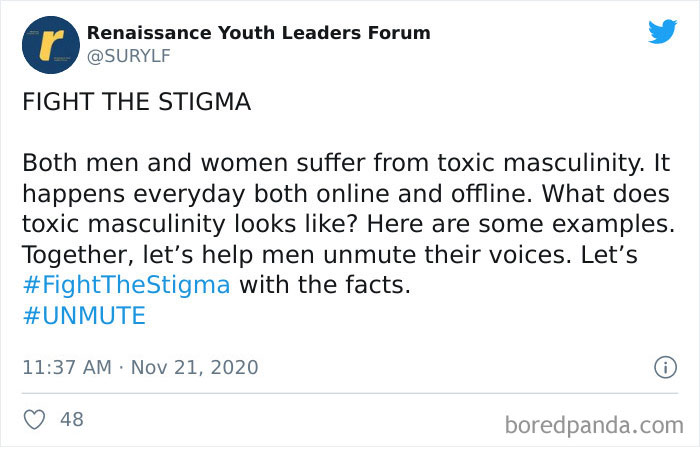
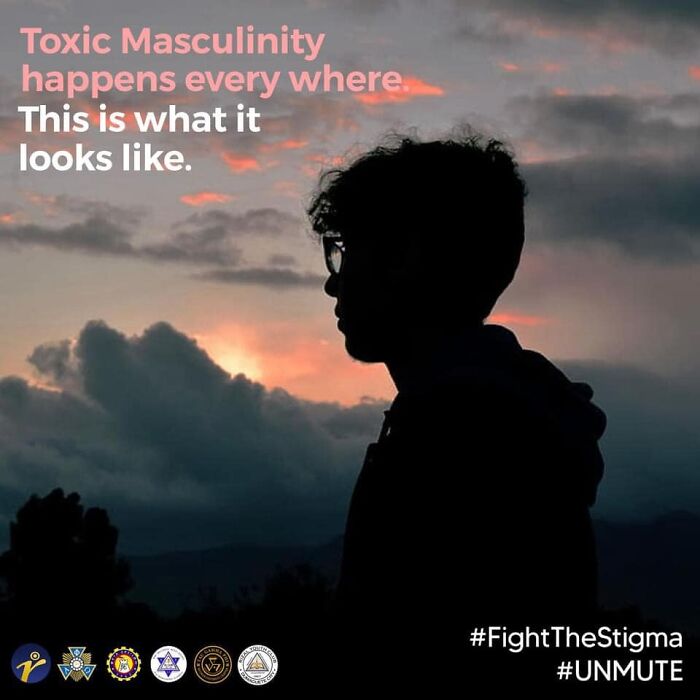
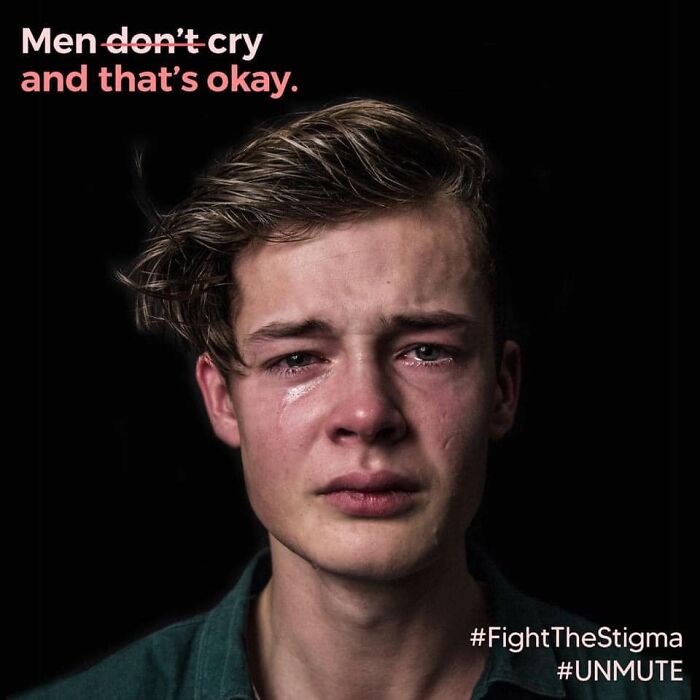
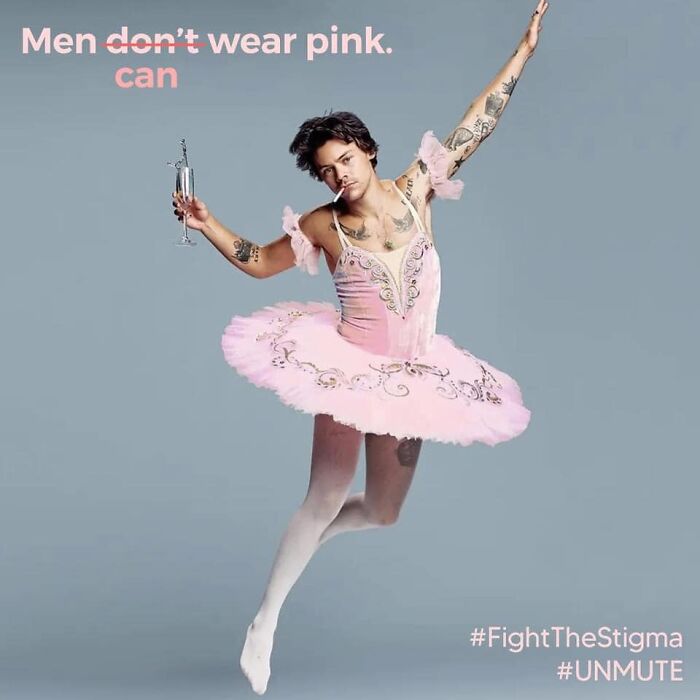
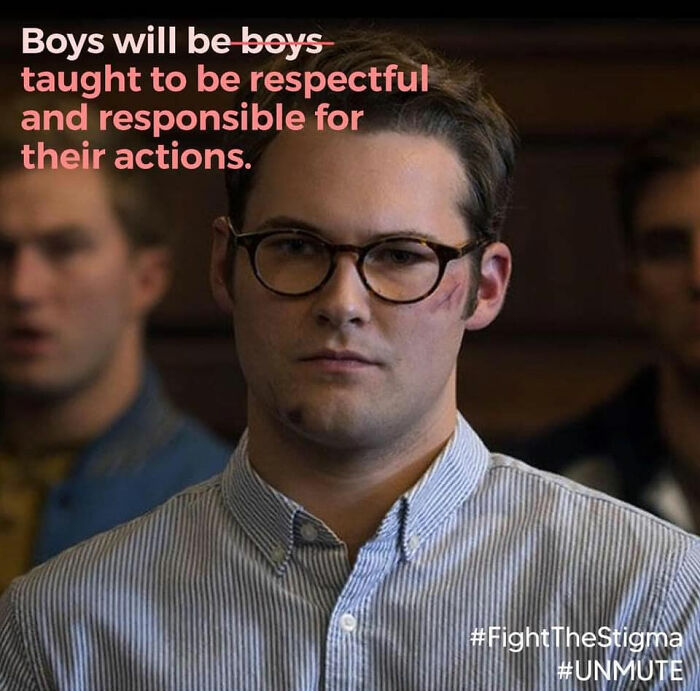
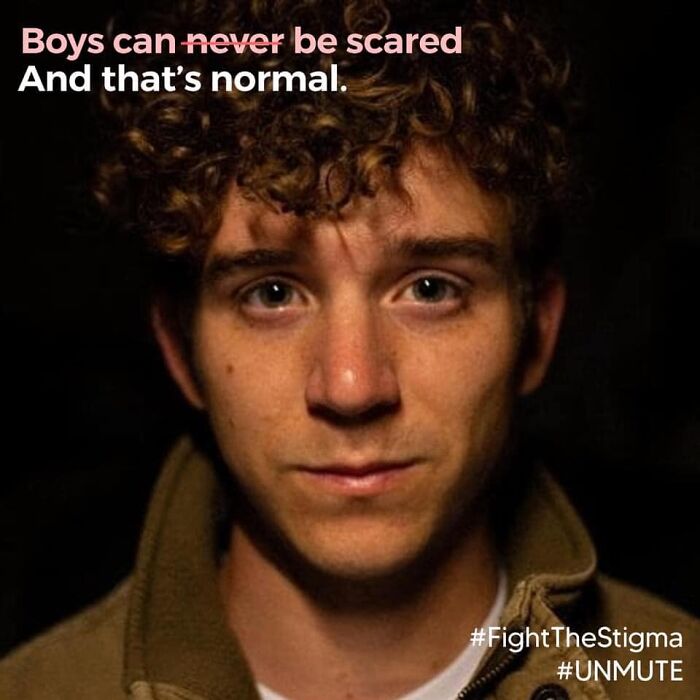
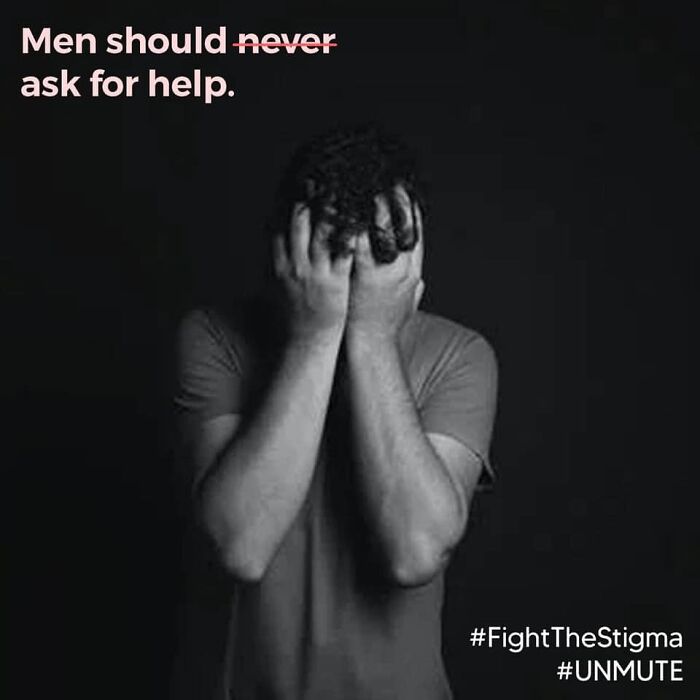
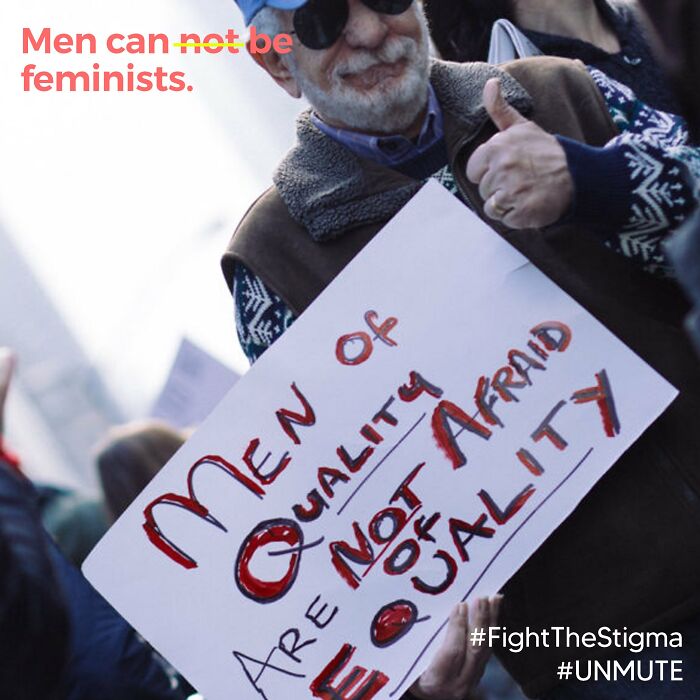





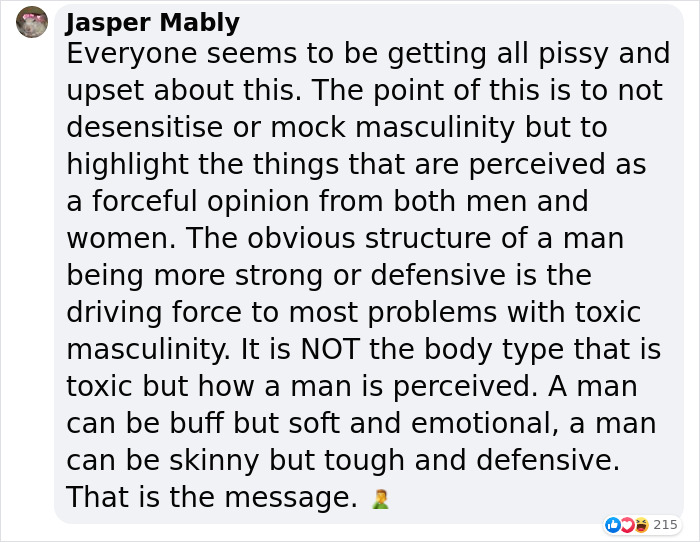
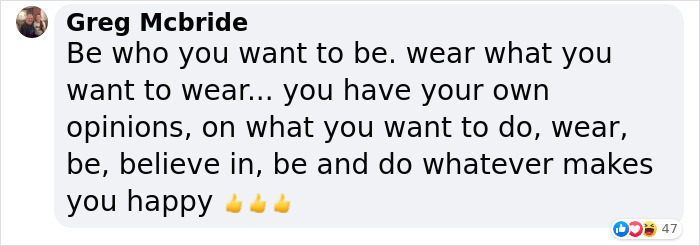

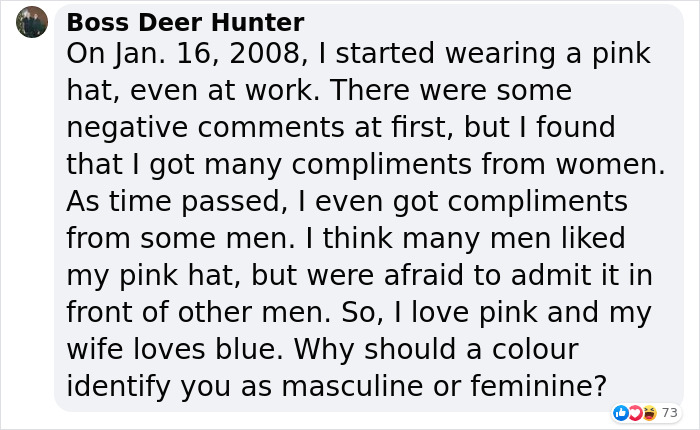







262
176